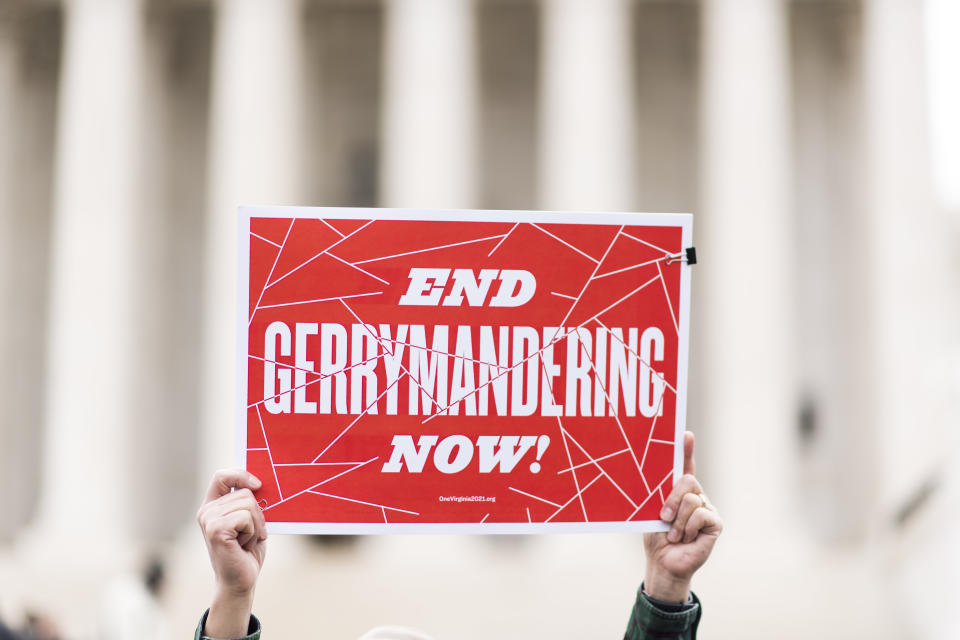In new film 'Slay the Dragon,' the villain is gerrymandering

“Slay the Dragon,” a new documentary that had its premiere at this year’s Tribeca Film Festival, shows how regular citizens are battling against gerrymandering.
“Dragon” lays out how the drawing of hyperpartisan legislative maps in the wake of the 2010 midterms has led to legislatures across the country where members are no longer accountable to their full districts; the only threat to incumbents comes from primaries, usually by the most extreme members of their own parties.
A number of courts have ruled that the practice violates one-person, one-vote provisions of state constitutions; the Supreme Court has not ruled on whether it is prohibited by the U.S. Constitution.
Gerrymandering is not a new phenomenon; the title of the film comes from the original “Gerrymander” by an early 19th century Massachusetts governor, Elbridge Gerry, whose administration drew a state legislature map so convoluted that one district was said to look like a salamander. But the issue took on new intensity following a 2010 Republican effort to change the district lines called Project REDMAP. After taking over a number of state legislatures and governors’ mansions, Republicans drew lines that packed Democratic voters into the fewest possible districts, while distributing Republicans to create as many safe GOP seats as possible. The gerrymanders were so successful in some states that although Democratic candidates in total received a substantial majority of votes, Republicans came away with a majority of legislative seats, allowing them to pass bills without fear of electoral consequences.
The film follows multiple tracks, but the most prominent involves a ballot initiative in Michigan begun by then-27-year-old political novice Katie Fahey, one of the founders of the Voters Not Politicians group. Fahey’s plan, which started with a Facebook post following the 2016 election, was to get an amendment to the state constitution on the 2018 midterm ballot that would create an independent citizens’ commission to manage the decennial redistricting process, taking it out of the hands of the legislators. The film shows her pressing her cause on local television, arguing down questioners who doubted her chances of success, and being accused of being a tool of big Democratic donors.
Fahey and what became Proposal 2 survived an arduous process just to get the redistricting plan on the ballot. First, an all-volunteer group collected nearly 400,000 valid signatures, clearing the 315,654 necessary for an initiative in Michigan. Then they barely survived a judicial challenge by opponents who said the measure was too broad, winning a 4-3 decision in the state Supreme Court. Despite a well-funded opposition campaign, supported by substantial donations from the family of Education Secretary Betsy DeVos, attempting to portray the citizens’ commission as an unaccountable money pit, the measure passed easily with 61 percent of the vote. Underlining Fahey’s argument, a federal judge ruled in April that the Michigan maps were so gerrymandered that they were an “extremely grave” constitutional violation and needed to be redrawn even before the 2020 election, rather than waiting for the 2020 census results.
In Wisconsin, the film tracks a prolonged court challenge to the maps that eventually reached the U.S. Supreme Court in a 2018 case that was sent back to the lower courts. Directors Barak Goodman and Chris Durrance told Yahoo News they also wanted to cover North Carolina, but the story was both too tangled to tell in full and “so depressing” that they focused instead on how Republican politicians in the state targeted black voters in an effort to keep them from voting or nullify their ballots.

While Republicans have mounted the most aggressive and successful efforts over the last decade, Durrance said they found instances on both sides.
“I think what we’ve found in crisscrossing the country is that all voters find this notion that the rules of the game have been rigged objectionable,” said Durrance. “As soon as they realize how pervasive it is and how consequential it is and how big of a role it’s playing in this dysfunctional political environment that we’re living in, they rise up and want to change it.”
In addition to the victory in Michigan, ballot measures for independent redistricting measures were also successful in traditionally red states such as Missouri and Utah during the 2018 midterms, although legislatures there are attempting to undercut the results. Similar measures to independently draw the lines for federal and state districts also passed easily in Colorado. Friday brought another strike against gerrymandering, with a three-judge federal appeals court panel in Ohio ruling unanimously that the state’s congressional map was unconstitutional and needed to be redrawn in advance of the 2020 election.
Perhaps “Dragon”’s greatest accomplishment is making process-heavy political maneuvering interesting, adding drama to everything from the collecting of signatures to the recovery of deleted spreadsheets. Durrance said it wasn’t difficult, comparing the subject of the film to following along with a “whodunit” and “detective story” as anti-gerrymandering activists attempted to track down documents to make their case.
The film doesn’t shy from the challenge facing activists. If one Michigan Supreme Court judge had voted the other way, Prop 2 wouldn’t have been on the ballot. The Supreme Court has struck down racial gerrymandering but how it might rule on a partisan gerrymandering case is an open question.
Goodman was hopeful that representation would become more equitable after gerrymandering was struck down. He said he was encouraged by the example of Pennsylvania, where the U.S. House delegation flipped from 13 to 5 in favor of Republicans to an even split after the state Supreme Court ruled for the maps to be redrawn in advance of the 2018 midterms.
“Gerrymandering has been their shield between themselves and the voters but when that shield is removed, as it was in Pennsylvania for example, this shamelessness will be their own undoing,” said Goodman. “They are so out of whack with their non-gerrymandered constituency that they will be punished ultimately when the maps become fair.”
He added that although everyone might not agree, extreme gerrymandering will be ended, either by the Supreme Court or “a political reckoning.”
“You hope so, because the other scenario is just too horrific to contemplate: It’s a breakdown of democracy,” added Durrance. “That’s what people fear.”
“Slay the Dragon” will be released later this year.
Read more from Yahoo News:



